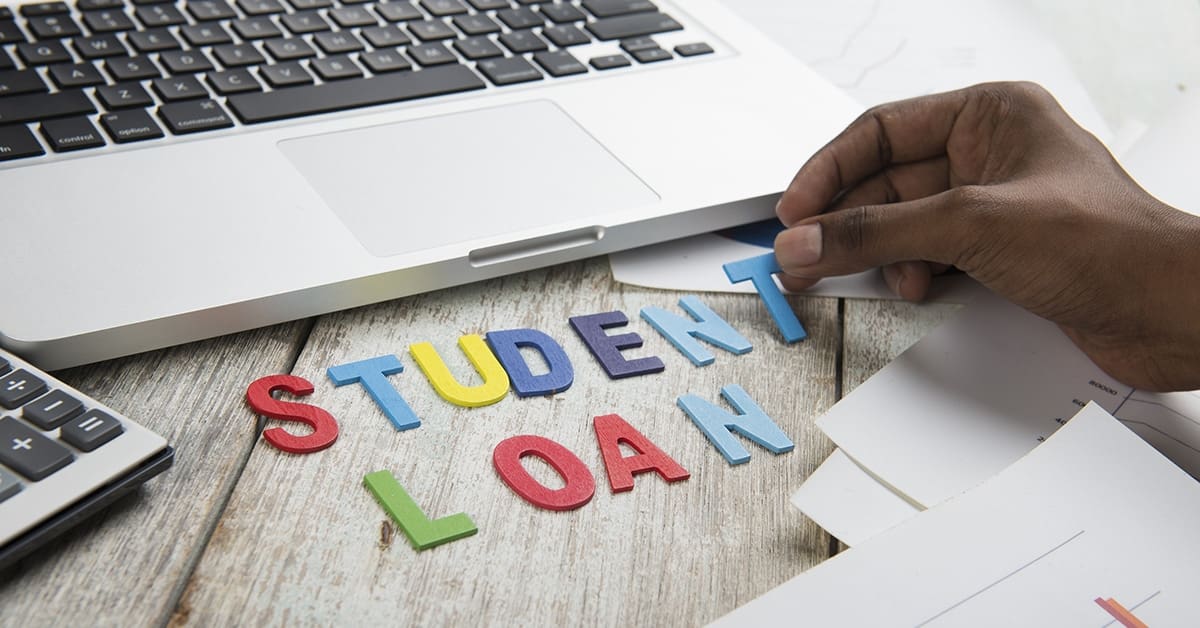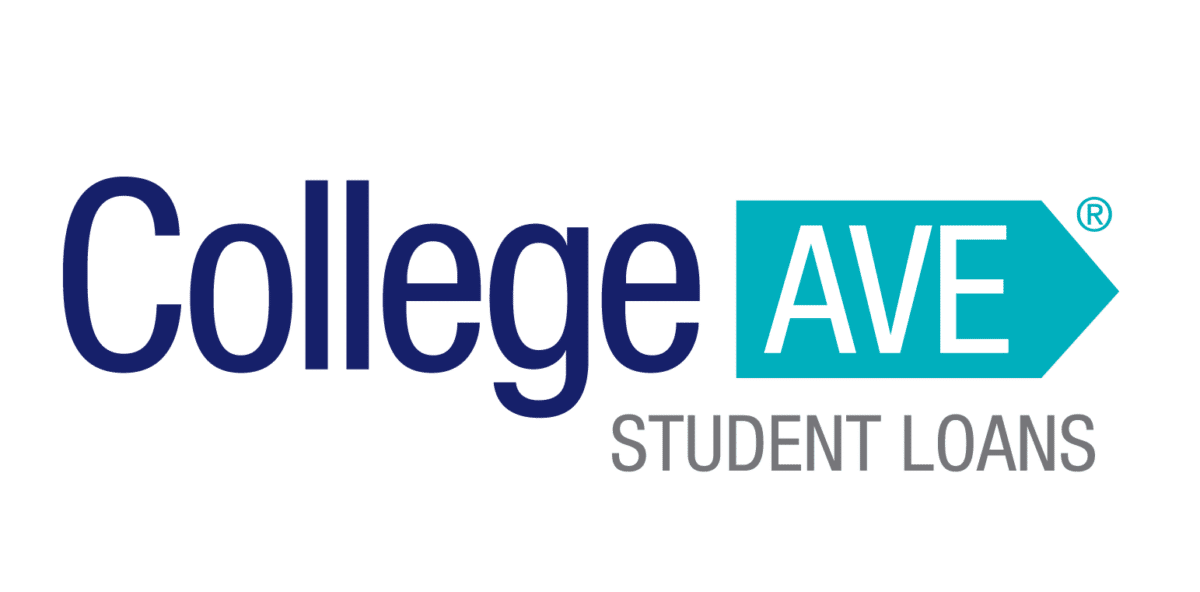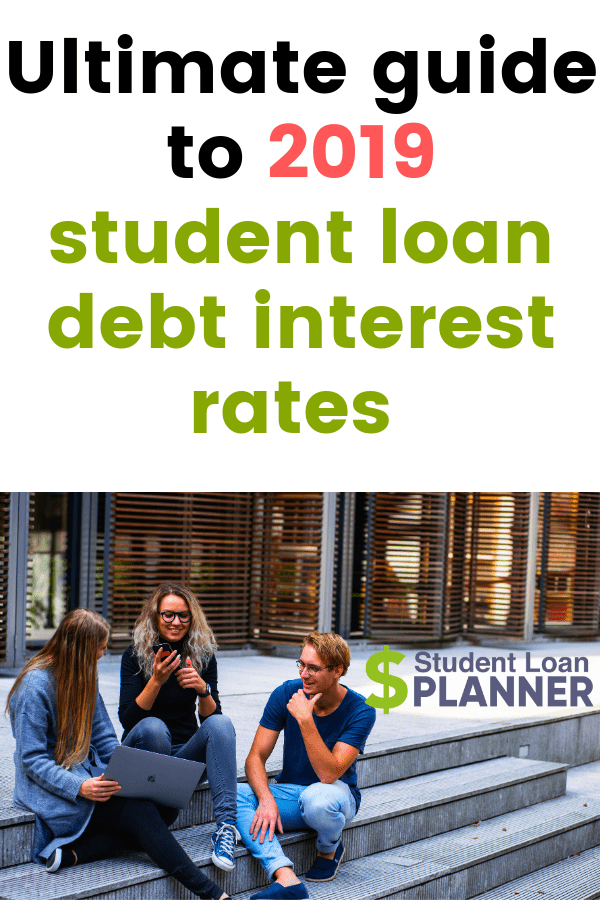
Student loan interest rates have a large impact on student loan repayment.
According to a 2017 report by nonprofit organization New America, “The average interest rate across all student loans is 5.8 percent before refinancing, and drops to 4.2 percent if all eligible borrowers refinance.”
We’ve compiled current rates for federal loans, private loans, and refinancing.
Federal student loan interest rates
Federal student loan interest rates are generally set mid-year for the following academic year. Federal student loan rates are set by Congress, not the Department of Education, and rates generally change every year.
These are fixed rates that will not change for the life of the loan. Here are the current interest rates for the 2021-2022 school year:
| Federal student loan | Interest rate |
|---|---|
| Undergraduate (direct subsidized loans and direct unsubsidized loans) | 5.50% |
| Graduate (direct unsubsidized loans) | 7.05% |
| Parents and graduate or professional students (direct PLUS loans) | 8.05% |
The federal interest rates increased for the 2021-22 school year from the previous year. Federal interest rates have fluctuated in the past five years but are on an upward trend. Here are federal student loan interest rates for the past five years:
| Academic year | Undergraduate loans | Graduate loans | PLUS loans |
|---|---|---|---|
| *3/2020 – 8/2023 | 0% | 0% | 0% |
| 2021-2022* | 3.73% | 5.28% | 6.28% |
| 2020-2021* | 2.75% | 4.30% | 5.30% |
| 2019-2020 | 4.53% | 6.08% | 7.08% |
| 2018-2019 | 5.05% | 6.60% | 7.60% |
| 2017-2018 | 4.45% | 6.00% | 7.00% |
| 2016-2017 | 3.76% | 5.31% | 6.31% |
| 2015-2016 | 4.29% | 5.84% | 6.84% |
| 2014-2015 | 4.66% | 6.21% | 7.21% |
The federal student loan interest rates for the 2019-20 academic year have not been released yet. They typically are available in May after the Treasury note auction.
Private student loan interest rates
Private student loan interest rates vary greatly. Rates offered by private lenders depend on factors like:
- Lender
- Type of interest rate (fixed or variable)
- Credit score, credit history and borrower’s income
- Loan terms
- Market trends
Private student loans are often utilized after a borrower exhausts all federal loan options. These loans are also a popular option used by students going into medical school, dental school, MBA programs and postgraduate studies. Here are interest rates for several of the private lenders we partner with:
Sallie Mae

- Fixed interest rates starting at 4.50% APR
- Variable interest rates starting at 6.37% APR
Earnest

- Fixed interest rates starting at 4.42% APR
- Variable interest rates starting at 5.62% APR
Ascent

- Fixed interest rates starting at 4.09% APR
- Variable interest rates starting at 6.22% APR
College Ave

- Fixed interest rates starting at 4.07% APR
- Variable interest rates starting at 5.59% APR
How to choose a private loan lender
Sometimes you need to take out a private student loan to fill the gaps that federal aid won’t cover. How do you go about picking the right private loan lender for you? There are many factors to consider when picking a lender, including:
- Interest rate
- Type of interest rate (fixed or variable)
- Lender reputation
- Repayment options
- Fees
- Cosigner release
- Deferment and forbearance options
There’s a lot to think about when it comes to private student loans. Most borrowers don’t have established credit and need a cosigner to be eligible for a private student loan. Private student loan interest rates can be fixed or variable.
Student loan refinancing interest rates
If you already have student loans, you can refinance your loans and potentially lower your interest rate. This could lead to huge savings in interest fees over the life of your student loan.
Keep in mind that if you refinance federal loans, you will lose access to federal protections like deferment, forbearance and federal loan forgiveness options. Here are interest rates for several private lenders that offer student loan refinancing:
SoFi: Best if you're unsure where to apply
- Positives: Competitive rates, flexible terms and view rates in just two minutes
- Allows cosigners: Yes, but no cosigner release offered
- Deferment or forbearance available: Yes, in limited situations
- Interest rates: Fixed rates 5.24 – 9.99% APR; Variable rates 6.24 – 9.99% APR (rates include optional 0.25% AutoPay discount)
- Bonus: $500 for refinancing 100k or more.
SoFi continues to be one of the top companies by total refinancing volume. They offer residency, fellowship and Parent PLUS refinancing. Currently, SoFi is offering rate discounts for medical and dental professionals. In addition to a 0.25% autopay discount, there's 0.25% off for those with an MD, DO, DDS, and DMD degree as well as 0.25% off for refinancing at least $150k in loans. Get up to a $500 SoFi bonus when you use our SoFi link to see if you qualify and refinance your student loans through them. *See disclosures here
Splash Financial: Best for easy application
- Positives: Compares multiple lenders, good customer service available
- Allows cosigners: No
- Deferment or forbearance available: Yes, length varies based on lending partner
- Interest rates: Fixed starting at 5.19% APR; Variable starting at 5.28% APR
- Bonus: $300 for 50k to 99k or $1,000 when you refinance $100,000 or more
Splash searches multiple lenders at once and provides a rate estimate very quickly. Their site provides one of the best user experiences, and you can get a rough estimate of how good your rate will be in the market as a whole by applying with them. Get up to a $1,000 bonus when you use our Splash Financial link to apply and refinance. Note that if you refinance $100,000 or more, $500 of the $1,000 bonus comes directly from Student Loan Planner®. Lowest rates displayed may include an autopay discount of 0.25%.
Earnest: Best for flexible repayment
- Positives: Flexible repayment terms, custom loan payments
- Allows cosigners: Yes
- Deferment or forbearance available: Yes, up to 36 months
- Interest rates: Fixed starting at 5.19% APR; Variable starting at 5.99% APR
- Bonus: $200 for refinancing 50k to $99,999; $1000 for refinancing 100k or more.
Payment flexibility and consistently low rates make Earnest a top lender Student Loan Planner® readers use when refinancing student loans. Earnest also services its own loans and has a Rate Match program that matches competitors' contractual interest rates. If you refinance $100,000 or more, you can get a $1000 bonus ($500 Earnest bonus + $500 from Student Loan Planner®). *See Earnest disclosures
Laurel Road: Best for medical professionals
- Positives: Flexible repayment terms, profession based discounts
- Allows cosigners: Yes, cosigner release available after 36 months
- Deferment or forbearance available: Yes, up to 12 months
- Interest rates: Fixed starting at 5.44% APR; Variable starting at 5.49% APR
- Student Loan Planner® bonus: $300 for refinancing 50k to 100k, $1,050 for refinancing over 100k, OR interest rate discount if applicable.
While Laurel Road serves all borrowers, it is a must check for medical professions as well as Parent PLUS loan borrowers. They offer residency and fellowship refinancing and an additional 0.25% rate discount based on membership to different medical and dental associations. Laurel Road will automatically apply the better of our bonus up to $1,050 OR an applicable professional association discount you qualify for when you use our link to apply. *See disclosures
ELFI: Best for customer service
- Positives: Highly competitive fixed rates
- Allows cosigners: Yes, but no cosigner release
- Deferment or forbearance available: Yes, up to 12 months
- Interest rates: Fixed starting at 5.48% APR; Variable starting at 5.28% APR
- Bonus: $300 for refinancing at least $50,000. $575 for 100k to 149k, and $1,275 for refinancing 150k+.
Education Loan Finance, aka ELFI, excels with customer service and low rates for borrowers with the highest credit scores. There is a minimum loan size of $10,000 but no max loan size, and their fixed rates are very competitive historically. Expect about 5 minutes to get an initial rate estimate. Get up to a $1,275 bonus when you use our ELFI link. ($500 of this would come from Student Loan Planner®). *See disclosures
Credible: Best for comparing multiple lenders
- Positives: Strong application experience
- Allows cosigners: Yes
- Deferment or forbearance available: Yes with some lenders
- Interest rates: Fixed starting at 5.28% APR (with autopay)*; Variable starting at 5.28% APR (with autopay)*
- Bonus: $1,250 bonus for loans over $100k, and $350 for loans $50k to $100k
Credible presents offers from multiple lenders, which offer varying rates, terms and perks like unemployment protection. The application experience with Credible is one of the fastest of any refinancing company. Get a $1,250 bonus on refinances over $100k or $350 bonus for loans under $100k when you use our Credible link. ($500 of the $1,250 bonus comes directly from Student Loan Planner®).. *See disclosures. Read rates and terms at Credible.com
How to choose a refinancing lender
Refinancing your student loans could be the way for you to get out from your student loan debt. This can be done by securing a lower interest rate and negotiating better student loan terms. Looking for a private lender for student loan refinancing is similar to looking for a personal loan lender. Factors to consider when choosing a student loan refinancing lender include:
- Interest rate
- Lender reputation
- Repayment options
- Fees
- Cosigner release
- Loan deferment and forbearance options
In the end, the right lender will depend on what’s most important to you. One of the main reasons to refinance is to secure a lower interest rate. This could potentially save you thousands of dollars in interest payments over the life of your loan.
How to choose between federal and private student loans
As mentioned before, private student loans are often used after a borrower exhausts any federal student aid. This is especially true when completing an undergraduate degree program.
Federal student loans are the best choice if you want to pursue student loan forgiveness. This could be through Public Service Loan Forgiveness (PSLF) or income-driven repayment forgiveness. Federal student loans also offer better loan deferment and forbearance options than private student loans.
If you’re planning to continue your education past undergraduate studies, you may need to take out private student loans to pay for school.

How to get the best private student loan and refinancing interest rates
If you do choose to apply for a private student loan, there are things you can do to secure a lower interest rate. This is also true if you are applying to refinance an existing loan. What are some ways you can lower your interest rate?
- Improve your credit score
- Find a cosigner with excellent credit
- Take advantage of interest rate discounts for setting up automatic monthly payments
- Pay your bills on time
- Try for shorter repayment terms
The best way to lower your student loan interest rate is to refinance. The lower your student loan interest rates are, the less your overall debt bill will be in the end.
You can also refinance your student loans more than once. You can work to improve your credit score and refinance again, securing even lower interest rates.
Refinance student loans, get a bonus in 2024
| Lender Name | Lender | Offer | Learn more |
|---|---|---|---|

|
$500 Bonus
*Includes optional 0.25% Auto Pay discount. For 100k or more.
|
Fixed 5.24 - 9.99% APR*
Variable 6.24 - 9.99% APR*
|
|

|
$1,000 Bonus
For 100k or more. $300 for 50k to $99,999
|
Fixed 5.19 - 10.24% APPR
Variable 5.28 - 10.24% APR
|
|

|
$1,000 Bonus
For 100k or more. $200 for 50k to $99,999
|
Fixed 5.19 - 9.74% APR
Variable 5.99 - 9.74% APR
|
|

|
$1,050 Bonus
For 100k+, $300 for 50k to 99k.
|
Fixed 5.44 - 9.75% APR
Variable 5.49 - 9.95% APR
|
|

|
$1,275 Bonus
For 150k+, $300 to $575 for 50k to 149k.
|
Fixed 5.48 - 8.69% APR
Variable 5.28 - 8.99% APR
|
|

|
$1,250 Bonus
For 100k+, $350 for 50k to 100k. $100 for 5k to 50k
|
Fixed 5.48 - 10.98% APR
Variable 5.28 - 12.41% AR
|
Not sure what to do with your student loans?
Take our 11 question quiz to get a personalized recommendation for 2024 on whether you should pursue PSLF, Biden’s New IDR plan, or refinancing (including the one lender we think could give you the best rate).

